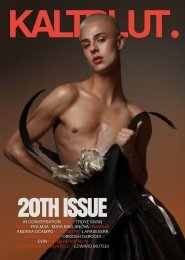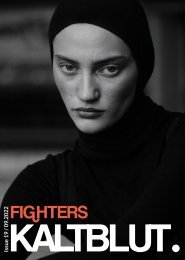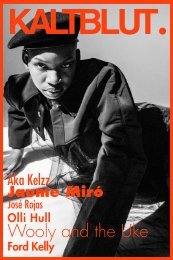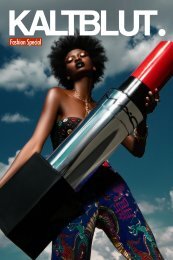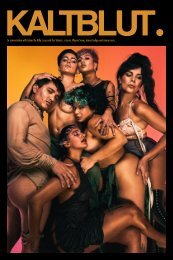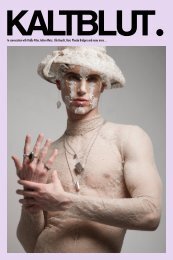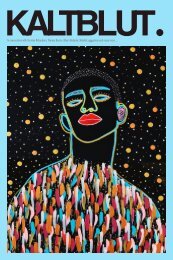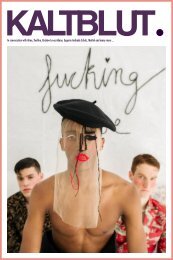KALTBLUT-HONK! 03 The Divas
issue #03. Published 15.05.2011 by Marcel Schlutt & Nina Kharytonova. Art, Fashion, Music and Photography. Artists: Natalia Avelon, Kazaky, Lola Depru, Christian Branscheidt and many more All Copyrights @ The Artists! Berlin 2012 www.kaltblut-magazine.com
issue #03. Published 15.05.2011 by Marcel Schlutt & Nina Kharytonova. Art, Fashion, Music and Photography. Artists: Natalia Avelon, Kazaky, Lola Depru, Christian Branscheidt and many more All Copyrights @ The Artists! Berlin 2012 www.kaltblut-magazine.com
You also want an ePaper? Increase the reach of your titles
YUMPU automatically turns print PDFs into web optimized ePapers that Google loves.
18
DON’T BLAME THE DIVA
flamboyant lifestyle, and a scandalising personality
on the other. The Caballé’s sunny disposition, The
Loren’s sharp wit, and The Fleming’s unshakable
grip on reality are vivid examples for artistic genii
acting out their extraordinary talents while at the
same time cultivating their authentic selves. Modern
divas, on the other hand, tend to concentrate
on rather flamboyantly-seeming peculiarities: In a
2008 article on guardian.co.uk Ian Gittins presented
some contemporary artists that are considered
divas and their habits: from Madonna demanding
“25 cases of Kabbalah water backstage at her gigs,
not to mention 12 dozen boxes of strawberries and
Yorkshire tea” to Mariah Carey’s “bottle of Cristal,
four champagne glasses and a box of bendy straws”
to Jennifer Lopez “scal[ing] down her fruit demands
at a recent Miami charity event to merely mango,
green seedless grapes, pineapple, papaya, cantaloupe,
honeydew melon and watermelon. None of
[which] were to enter the sacred space of her personal
all-white dressing room”. The illustrious list of
prominent singers and their culinary needs goes on
like that (and can be found here: http://bit.ly/fooddivas).
We should thanks Susan Boyle for saving the
day; in 2010, Alan McGee stated in the Guardian’s
music blog: “All hail Susan Boyle, the cool new diva
of our age. More than just a Cowell creation, [she]
puts loneliness and pain into her music […]”.
But how come that we obviously use the word “diva”
in such confusingly inconsistent ways? What kind
of concept is it that lies behind the use of a word
that has faced such an enormous change of meaning
within the past, say, decade? More fundamentally
one might ask: what exactly does it mean to be
called a diva nowadays?
Originally, the concept of a diva didn’t have anything
to do anything with a person’s character. The
word “diva” comes from the female form of the Latin
word “divus, -a, -um”, meaning “god” or “godlike”.
Which means: being a diva used to be about something
supernatural being associated with a certain
person. Very much like the gods of Ancient Rome or
Greece where specialists in their fields of expertise
(eg war, love, or the weather), a diva was originally
associated with a rare talent that might have appeared
superior to what someone who had been less
blessed could ever manage to achieve. Or, to quote
a dimplier definition, which TIME magazine stated
in their 21 October 2002 issue: “By definition, a diva
was originally used for great female opera singers,
almost always sopranos.” Thus, Melpomene, the
singing goddess and muse of Tragedy, could be considered
the first of the divas.
On Earth, Ancient Greek actor Thespis of Icaria is
considered the first of the divine talents in the Western
world. Not only was Thespis the first person
ever to appear in a play as a character assuming the
resemblance of another person – thus presumably
“inventing” acting as well as the genre of tragedy. He
is also said to have been a singer of songs about mythology;
which is why one might argue that he was
in fact the first professional performer, what’s more:
a multi-talented one. On a side note, Thepsis would
also frequently tour the cities carrying his costumes
and masks in a horse-drawn wagon.
In recent years “diva” has gone through an interesting
shift of meaning, leading to a large bandwidth
of attributes connected with the concept behind
the word. These days, calling someone a diva isn’t
necessarily an expression of admiration or appreciation.
I’m actually the living proof for this thesis, as I
have myself been called a diva on several occasions
during my life – and I’m obviously not blessed with
any exceptional artistic talent. So, if someone says
to you: “Don’t be such a diva”, his actual aim will
be rather to tell you to come down, maybe reflect
on how you were just behaving or what you were
saying. Obviously, when used in such contexts, the
word diva has been attributed additional meaning,
linguistically speaking: “diva” has turned polysemic.
A polyseme is a word that is actually two or more
different words that just randomly look the same.
Polysemes have different meanings, which aren’t
necessarily based upon the meaning of one origin
word. However, basically they come to existence
when a word that has become popular is taken out of
its original context and is put into a new one instead,
often giving the word a completely new meaning.
That very same thing seems to have happened in the
case of diva. Disregarding the multitude of character
traits that can be found when taking a look at
the classical opera and Hollywood divas, popular
language has adopted the word “diva” to refer to the
character of a person being rather eccentric (or very
much into herself/himself) compared to what might
be considered “normal” within a certain society.
This concept must then have been adapted to refer
to singers that are said to act diva-ish, which finally
led to the the word “diva” often being used pejoratively.
Nowadays, the word “diva” often refers to
someone – not even necessarily a celebrity anymore





